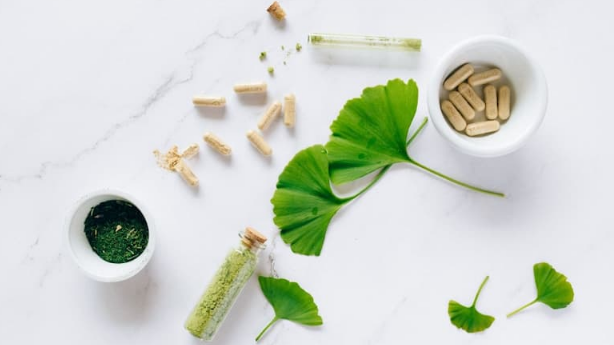Did you know that there is a plant that has existed for thousands of years? But that’s not the most surprising part. Ginkgo, or Ginkgo Biloba, has been passed down through generations, offering us its healing properties and helping to improve our health.
Known for its long history in traditional medicine, it is acclaimed for its multiple health benefits. This ancient tree, originating from China, is famous for its antioxidant properties and its ability to improve blood circulation. Although it is commonly used to enhance memory and cognitive function, particularly in the elderly, the effectiveness of Ginkgo in these areas has shown varied results. Some studies suggest a moderate improvement in memory in healthy adults, while others find no significant benefits.

What is Ginkgo Biloba?
Known as Ginkgo (Ginkgo Biloba), it is an ancient tree originating from Japan and China. According to some studies, it is one of the oldest living plants globally, with fossil records dating back to the Jurassic era. It is preserved throughout the Asian continent, although today it is common to see its cultivation in various countries worldwide, either for its properties or for its ornamental beauty. In the United States, Europe, and Korea, it is mainly planted for its healing properties.
What is Ginkgo Used For?
This plant has significant value in traditional Chinese medicine; the extract obtained from its leaves allows for increased blood flow and enhanced mental vitality, which helps improve the central nervous system and positively influences the cardiovascular system.
In its leaves, we can find an element known as “flavonoids.” These are responsible for helping the central and peripheral blood system and are widely used in older people, who are prone to cardiovascular diseases.
Some studies have shown that its seeds improve dermatological diseases, such as acne, dermatitis, and psoriasis, as this tree has great antibacterial properties.

Advantages and Disadvantages of Ginkgo Biloba
As we have seen, this plant has significant health benefits for humans. One of its most important properties is preventing mental problems, such as dementia. Although more studies are needed to indicate its exact efficacy in this field, we will summarize some advantages and disadvantages of ingesting this medicinal plant.
Advantages
- Helps combat anxiety.
- Improves the circulatory system.
- Alleviates joint pain, reducing cramps.
- Serves as an ornamental plant.
- It is a slow-growing plant but adapts well to the soil.
- This plant is very safe to consume; it has been on the market for many years.
Disadvantages
- It has many interesting properties, but many are not scientifically proven.
- Its seed has a very bad odor, making it uncomfortable to cultivate.
- It can produce side effects like vomiting, diarrhea, or nausea (although there are very few records of these cases).
Benefits of Taking Ginkgo Biloba
In the leaves of this plant reside most of its properties, being the basis for the elaboration of various products. Among its main benefits, most medicinal properties help combat circulatory ailments, preventing cramps, and decreasing sensations of cold in the limbs.

Many neurological studies confirm that regularly taking Ginkgo Biloba will benefit your memory. Likewise, it will improve our mood by reducing stress and anxiety.
On the other hand, some experts in Phytotherapy have guaranteed that Ginkgo has attributes to combat phlegm, positioning itself as a natural expectorant. Despite this, its use in various fields of medicine has not yet been demonstrated through more specific studies.
How to Use Ginkgo Biloba?
The most common method of consumption is through capsules, as each comes with a recommended dose; these usually provide benefits to memory and the circulatory system; however, it is recommended to follow the recommendations presented on the bottle or packaging and not exceed the suggested doses.
Ginkgo Biloba ampoules are also very practical and easy to consume. Typically, these ampoules are based on Ginkgo, applied for ailments and inflammation of the joints.
Many athletes use the plant in gel form, facilitating its topical use on the limbs to reduce and alleviate muscle pains almost immediately. But it can also be ingested as an infusion, preparing tea with its leaves (although it is not recommended to ingest it for more than 14 continuous days).
Contraindications of Ginkgo Biloba
If we consume the Ginkgo Biloba plant in the proper and recommended doses, the risk of suffering side effects is very low. However, it is advisable to inform yourself about its long-term consumption and consult a specialist doctor.
Ginkgo Biloba use is not recommended for people with the following conditions:
- It cannot be administered to women in pregnancy or breastfeeding.
- Small children under five years of age.
- Patients who are administered anticoagulants or who have frequent bleeding.
- People who suffer epileptic attacks or seizures.
Adverse Effects of Ginkgo
Like many medications, Ginkgo Biloba can produce adverse effects; although it is very unlikely to happen, precautions should be taken. They tend to be mild or transient; allergies, gastrointestinal pains, and headaches are among the most relevant.
It is not recommended to take Ginkgo Biloba simultaneously with medications like aspirin, ibuprofen, and antidepressants. There have been some cases of people who have presented bleeding after its consumption, and most were patients who were administered anticoagulants or some other type of anti-inflammatory.
If you experience any of the aforementioned adverse effects, you should go to the doctor, even if it is an effect not previously mentioned.

